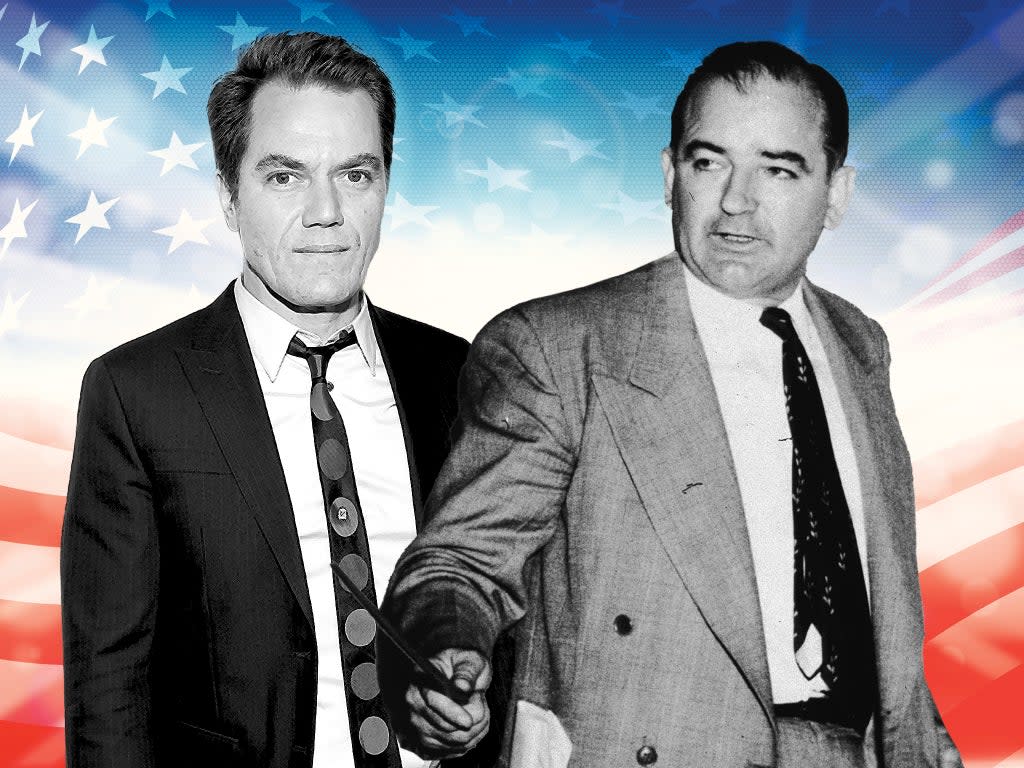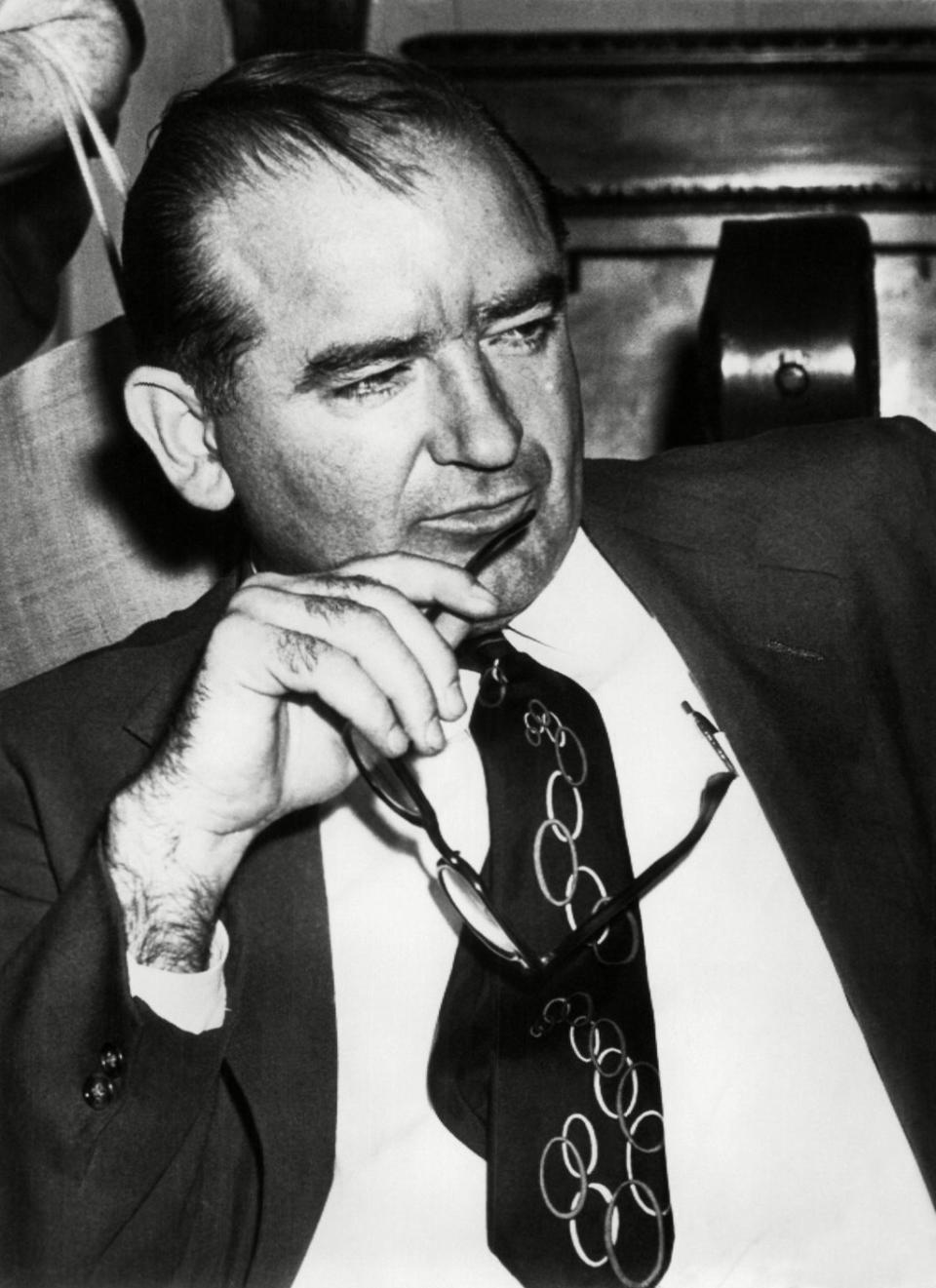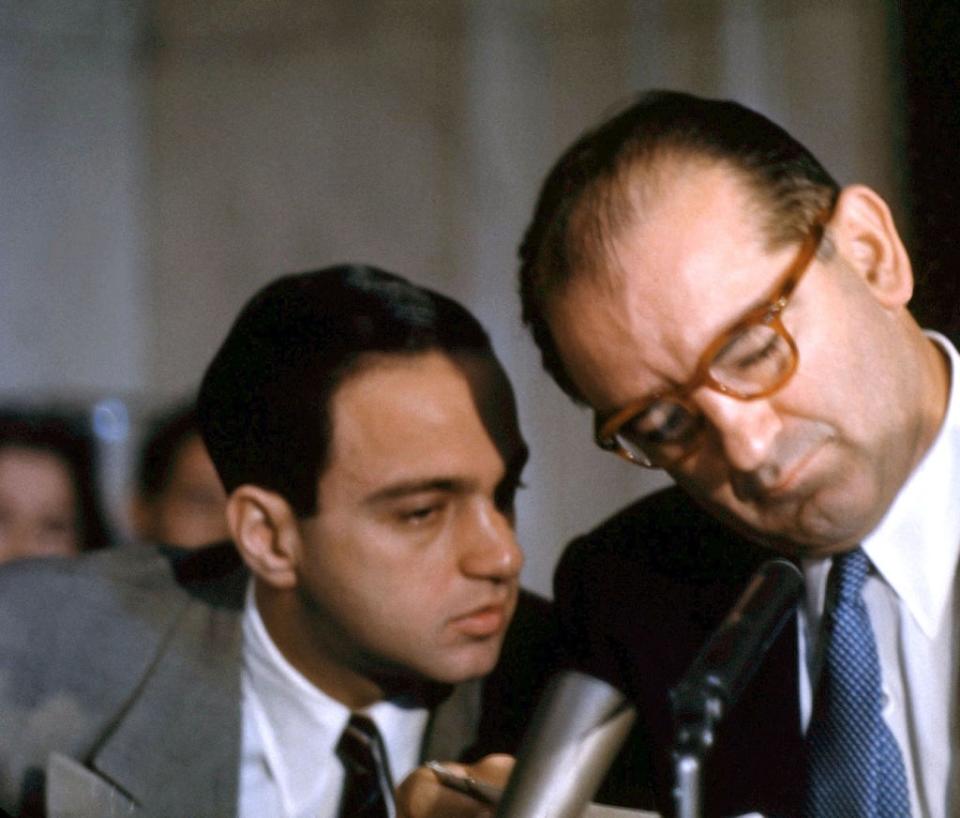Why Michael Shannon is so right to play red-baiting senator Joseph McCarthy

- Oops!Something went wrong.Please try again later.
- Oops!Something went wrong.Please try again later.
- Oops!Something went wrong.Please try again later.
- Oops!Something went wrong.Please try again later.
It’s astonishing that cinema hasn’t done more with Senator Joseph McCarthy (1908-1957). The American anti-communist politician was a larger than life figure, a bully, fraudster and demagogue who knew just how to pander to American voters’ baser instincts. He was a regular fixture on every household’s television set in the early 1950s, and his name continues to be a by-word for persecution.
Nonetheless, for going on 70 years, filmmakers have remained strangely wary about portraying McCarthy on screen. It’s as if they feel that he is too toxic a figure to put in the middle of a movie. He has featured in many documentaries but his story has never been dramatised.
Now, at long last, the Republican senator is to get the big screen treatment. Michael Shannon has just signed on to portray him in a new movie to be made by The Painted Bird director Václav Marhoul.
“Given that McCarthy is such a darkly iconic figure in our history I was shocked that there had never been a film made about him,” the film’s screenwriter Tom O’Connor recently observed.
Why, then, has it taken so long? One suspects that few big name stars had either the will or the ability to play someone as reviled or as complex as this.
When George Clooney was making his 2005 film Good Night, and Good Luck, he got around the tricky problem of casting the senator by using old footage of McCarthy himself. Through clever cutting, it was made to look as if the senator and the courageous broadcaster Ed Murrow (David Strathairn), who questioned his methods, were on screen at the same time.
As Clooney later testified, some of his audience had never heard of McCarthy. They were so impressed by the “performance” that they tried to find out who was playing him. Clooney’s film does indeed give a very strong feel of what McCarthy was like. The politician is shown as a sweaty, sanctimonious sadist who takes a malevolent pleasure in “trying to drag the truth” from anyone he suspects of being a communist. At the same time, he is thin-skinned and very defensive when criticised himself.
It needs an actor with uncanny chameleon-like powers but also without too much vanity to compete with the real-life McCarthy shown in Clooney’s movie – and that is why Shannon is so well chosen. When it comes to portraying zealots or serial killers, emotionally deranged outsiders or martinet bosses, he has few peers. As he has demonstrated in projects from Boardwalk Empire to The Iceman, Shannon is one of those actors who makes villains seem sympathetic and heroes look twisted. He can combine gimlet-eyed fanaticism with charm and even vulnerability.
Nor is Shannon scared of showing his characters being humiliated on screen. It’s his skill at combining conflicting and contradictory traits that should equip him to take on the daunting challenge of playing the senator.
Perhaps surprisingly, at first glance, the red-baiting Republican Senator from Wisconsin doesn’t actually seem like such a monster. Look at old footage of him off-duty and you’ll find “quite a charming guy” (as one former associate remembers him). Balding but thickset, he comes across in TV interviews as measured, politely spoken and genial – a bit like the cartoon figure Mr Magoo. You wonder at first where his reputation for controversy comes from. That, though, is before he gets onto communism.

There is something frightening and disturbing about the physical transformation that takes place in McCarthy when he is haranguing the “reds” in the army, State Department or anywhere else. His brow furrows. His body convulses. His head jerks up and down angrily.
McCarthy basked in the media’s attention. Radiating both smugness and contempt, he hurled out accusations about all the traitors and fellow travellers supposedly hiding in every crevice of American public life. The more accusations McCarthy made, the higher his profile rose. The public was perturbed but morbidly fascinated at the idea there was a “fifth column” undermining the country from within.
It’s a measure of McCarthy’s forceful personality that he was credited with single-handedly sparking the anti-communist witch hunts. In truth, there were many others before him, both in Washington and in Hollywood, keen to smoke the reds out. His name, though, is the one that endures and continues to define the era.
McCarthyism cast a huge shadow over the film industry. Actors, writers and filmmakers were all blacklisted in the early Fifties. Careers were ended. Many notable figures, from Jules Dassin and Abraham Polonsky to Joseph Losey, sought refuge in Europe. Stars like Dorothy Comingore (from Citizen Kane) and Lee Grant saw their careers wither away. Friendships were severed, marriages broken.

Several films have examined the blacklisting and the communist menace. The Coen brothers’ Hail, Caesar! (2016), set in the Hollywood of the early 1950s, deals in comic fashion with the anti-communist paranoia of the period. Martin Ritt’s The Front (1976) has a more earnest perspective on the plight of blacklisted filmmakers, writers and actors who suddenly became unemployable, unless they managed to work incognito.
Trumbo (2016), Irwin Winkler’s Guilty by Suspicion (1991) and Frank Darabont’s The Majestic (2001) also looked at the blacklists – but they all shied away from depicting McCarthy himself.
Now, Shannon has picked up the gauntlet. He has already been researching McCarthy’s backstory, trying to work out what made him tick. “I was fascinated to learn that he had been a boxer and that he had been in the marines,” he recently told the trade press. “I think that physicality feeds into the strength of how he was able to convince people. Throughout the course of this story one thing that will dawn on the audience is how did a man this flawed and conflicted manage to pull the wool over so many people’s eyes.”
The film will deal with the senator’s private life. Emilia Clarke (Daenerys from Game of Thrones) has been cast as his wife and former aide, Jean Kerr, who was fiercely anti-communist herself. Director Marhoul has called her the Lady Macbeth in the story.
There was indeed something Shakespearean about the rise and fall of McCarthy. Few would see him as a tragic hero. He was too grotesque for that. Nonetheless, he was ultimately a victim of his own hubris.

“You’ve done enough. Have you no sense of decency, sir?” the US consul for the Armed Forces Joseph Welch famously asked McCarthy during the 1954 hearings into the army. That was the point at which the senator’s mystique suddenly began to vanish. His fellow politicians turned against him. Three years later, this seemingly robust and belligerent figure died aged only 48 from a liver condition brought on by alcoholism.
A direct line from McCarthy to former President Trump can be traced by following the career of the senator’s chief counsel and young protégé, Roy Cohn, who later went on to represent Trump in his 1970s property disputes. (Dane DeHaan will play Cohn in the new biopic.)
The new film is long overdue. Even without a movie of his own to commemorate his misdeeds, the senator still ranks as one of the prime villains in 20th Century US history. It will take a major performance to capture him in his full clammy hypocrisy, viciousness and self-righteousness. Shannon, though, looks to be the man for the job.
’Good Night, and Good Luck’ is available on Amazon Prime
Read More
It’s a wonderful life? The darker side of James Stewart’s screen persona
Dressed to kill: Why gangster and fashion films have a lot in common
Some Like Him Not: Why Billy Wilder divides opinion
The five best new books to read this month
Curated by Carlos shows off charisma of mature dancers – review
It’s a wonderful life? The darker side of James Stewart’s screen persona

